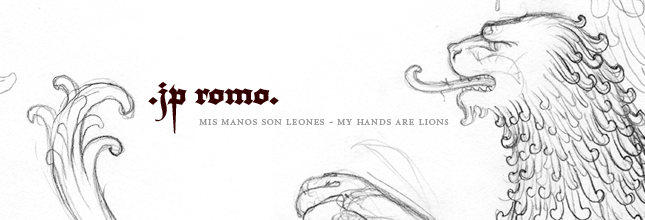

This is a poster I made to show people (and myself, sometimes) how me being 'different' from them is a good thing. I was slightly depressed because I felt my work (and my personality) didn't fit anywhere among the work of all the genius-crazy and unbearably creative conceptual artists that surrounded me at that particular time. They seemed so... concretely profound... or at least politically relevant... and then there were my drawings, subtle degrading to vague, and apparently shallow, all form and no meaning. But then I thought, "Hey, myself, your work is valuable on it's own right. Comparisons are, at best, pointless. Tell them." And along came the Lion and the Antelope, saying subtly (perhaps vaguely, but who cares) that diversity is good.
That's it for the poster, but I'd like to share some thoughts on diversity. About a month ago I attended a lecture by Frederick Willem de Klerk precisely about that. Being a former president of South Africa and a Nobel Peace Prize Laureate for leading his country out of apartheid, he must know what he's talking about. Among many interesting things, he said three that felt like revelations to me:
1. We all belong to many groups, and in some or all of them we are a minority.
2. To unite a crowd of ethnic groups, there must be a culture of pride in diversity.
3. No one should ever have to choose between two parts of their identity (for example, between their ethnicity and their nationality).
I think this last thought is beautiful and true. I wanted to ask him, though: how do you achieve that when a group feels that part of their identity is the conviction that another group should be erradicated, as is often the case with fundamentalists? I think a culture of pride in diversity doesn't need agreement, but it does need constant effort.
Some time ago, I heard the great Mexican flute player Horacio Franco say something that changed the way I thought about diversity. He said, "I hate the word 'tolerance'. 'You're horrible, but I tolerate you.' What we need is not tolerance, but understanding." I think a true effort to understand a posture opposite to ours, even if we don't succeed, makes us feel closer to our opponents, which eliminates (or at least reduces) the negative feelings that could later become violent actions. Making that effort is very difficult sometimes because, in the words of Stefan Sagmeister, "everybody thinks they are right." Me too. You too. But, paradoxically, I have found that realizing that simple fact makes it a lot easier.


1 comentario:
caray, buen jp... realmente me parece una maravilla este post... ya se que no soy un tipo que coopere en muchas ocasiones, pero en realidad creo que concuerdo y apoyo la postura, la diversidad, la comprensión y el entendimiento. si todos fuéramos iguales, no habría evolución.
seguiré tu blog con gran entusiasmo... por lo pronto, ya está en mis feeds XD
saludos!
Publicar un comentario